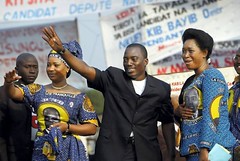
Democratic Republic of Congo President Joseph Kabila Between His Wife and Mother at Campaign Rally
Originally uploaded by Pan-African News Wire Photo File
Mon 17 Mar 2008, 17:29 GMT
By Joe Bavier
KINSHASA (Reuters) - At least 68 people were killed in a two-week government crackdown against separatists in Democratic Republic of Congo's western Bas-Congo province, according to internal U.N. reports seen by Reuters on Monday.
Starting on February 28, hundreds of soldiers and police battled members of the ethnic-based political and religious movement Bundu dia Kongo (BDK) in an operation that initially began at Luozi, 200 km (125 miles) west of the capital Kinshasa.
BDK is campaigning for reestablishment of the pre-colonial Kongo kingdom, which encompasses parts of present-day Angola, Democratic Republic of Congo, Republic of Congo and Gabon.
After the violence at Luozi, clashes moved from town to town as police pursued BDK militants in a security crackdown the government said aimed to restore state authority in Bas-Congo.
A U.N. source, who asked not to be named, said there were further clashes over this weekend in three different towns and that three more BDK militants were killed.
Congo's government has given an initial official death toll of 22 BDK militants killed during the Luozi clashes.
But the preliminary internal reports from U.N. teams, which have visited the areas worst hit by the violence, documented 68 deaths in the ongoing crackdown. The documents indicated the final death toll could be much higher.
Around 215 people, mainly families who fled after their homes were burned down during the operations by security forces, are still unaccounted for, the reports said.
U.N. spokesmen contacted by Reuters on Monday declined to comment on the reports, which have not been made public yet.
Congo's Interior Minister Denis Kalume said he stood by the death toll given by the government.
"We trust the information transmitted to us by the local authorities. (The U.N. investigators) have been manipulated. You must be very careful of those that are coming out and saying these things. There is a lot of manipulation," he said.
U.N. military observers who visited Luozi days after the clashes erupted said they believed as many as 50 people were killed there alone, the internal reports said.
Witnesses interviewed in the towns of Bandakani and Lufuku said at least 100 bodies had been thrown into the Luwala River by security forces following attacks on local BDK strongholds.
U.N. SLOW TO DEPLOY
Speaking to journalists last week, Alan Doss, the head of the 17,000-strong U.N. peacekeeping mission in Congo, known as MONUC, said he was aware of alleged human rights abuses reported to have been committed by both the police and BDK followers.
"The situation in Bas-Congo worries us very much," he said.
"MONUC will investigate the allegations of human rights violations purportedly committed," he added.
Following the first clashes last month, MONUC, which is already overstretched trying to pacify Congo's conflict-torn east, scrambled to reinforce its presence in Bas-Congo.
The first U.N. soldiers and police arrived in the areas of conflict nearly a week after the beginning of clashes.
In January 2007, 105 people were killed in an earlier government military crackdown against BDK supporters who were protesting against alleged fraud in provincial governor polls.
A U.N. human rights report on that violence accused authorities of "excessive and indiscriminate lethal force".
A separate inquiry by Congo's parliament concluded security forces battled "an illegal armed group" which attacked them and committed murder, arson, looting and rape.
Opposition lawmakers and human rights campaigners dismissed the parliamentary report as a one-sided whitewash.
(For full Reuters Africa coverage and to have your say on the top issues, visit: http://africa.reuters.com/)
(Editing by Pascal Fletcher and Mary Gabriel)
No comments:
Post a Comment